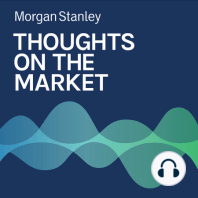3 min listen
Andrew Sheets: A Taper Without a Tantrum?
ratings:
Length:
3 minutes
Released:
Nov 4, 2021
Format:
Podcast episode
Description
Central bank support has been a key driver of market strength since last year. So how will markets react during the months-long tapering process?----- Transcript -----Welcome to Thoughts on the Market. I'm Andrew Sheets, Chief Cross-Asset Strategist for Morgan Stanley. Along with my colleagues, bringing you a variety of perspectives, I'll be talking about trends across the global investment landscape and how we put those ideas together. It's Thursday, November 4th at 2p.m. in London. Since the start of the pandemic, the Federal Reserve, along with many other global central banks, instituted massive purchase programs of government bonds and mortgages. These purchases, known as quantitative easing, or QE, were designed to keep interest rates low and boost liquidity in financial markets during a time of stress. Since February of 2020, these purchases caused the Fed's bond holdings to rise by $4.4 Trillion dollars. On Wednesday, the Federal Reserve announced its intention to start dialing these purchases back. To be clear, the Fed will still be buying a lot of bonds over the coming months. But after buying $120 billion of securities in October, the fed will buy $105 billion in November and $90 billion in December, a trend our economists think mean that they will cease these purchases entirely by June of next year. This ‘tapering’ of purchases and its impact for markets is a major source of debate. One school of thought is that central bank support has been the main driver of market strength, not just recently, but going all the way back to the global financial crisis. Markets, after all, have done better when the Fed has been buying bonds. But as much as you'll hear phrases like "the market is only up because of the Federal Reserve", this idea can suffer from some real statistical fallacies. Yes, markets have done better when the Fed has felt the need to support the economy. But the Fed has generally felt this need when conditions were bad, and bad conditions often meant lower market prices—something that was true in, say, the autumn of 2012 or March of last year. I know this is the type of hard-hitting financial insight you expect from this podcast but buying when prices are low tends to produce superior returns. So what does ‘tapering’ mean? Well, one thing we can look at is the last time the Fed started to dial back its purchases. After a strong year for markets and the economy in 2013, the Fed started to ‘taper’ its bond purchases in January of 2014. That turned out to be a bad month for markets. But the reasons were important. U.S. data was unusually weak, China's economy was slowing and there were troubles in emerging markets, including Argentina. The market's response, we'd argue, was very normal and fundamentally driven. The best example of this? Even though the Fed was reducing its bond purchases in January, bond prices actually rose, which is what you'd expect when concerns around growth increase. The data ultimately improved, and 2014 turned into a reasonable year for stocks, albeit a shadow of the stellar returns of the year before. But putting it all together, we think 2014 provides an important clue for how markets could respond to tapering: as the Fed becomes less involved in the markets, fundamentals matter more, and become a larger driver of whether markets will sink or swim. Thanks for listening. Subscribe to Thoughts on the Market on Apple Podcasts or wherever you listen and leave us a review. We'd love to hear from you.
Released:
Nov 4, 2021
Format:
Podcast episode
Titles in the series (100)
Mike Wilson: 3 Summer Surprises Investors Could Be Missing by Thoughts on the Market
